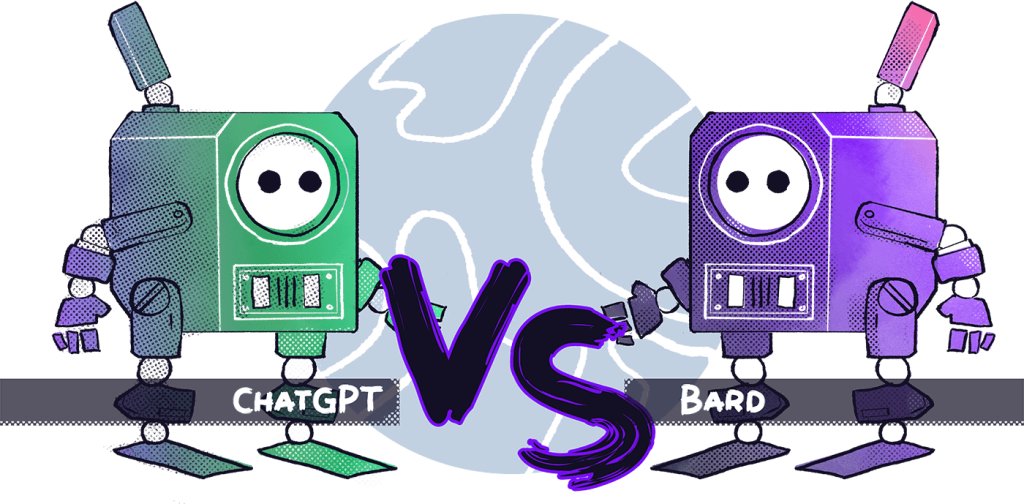In the realm of programming, Generative AI has become an invaluable ally, aiding developers in writing, debugging, and refining code. As we navigate this evolving landscape, two prominent tools stand out: ChatGPT and Bard. But which one is the best fit for your coding needs? In this article, we’ll explore the features and capabilities of both tools to help you make an informed choice.
Understanding the Differences
The core distinction between ChatGPT and Bard lies in the underlying models they utilize. ChatGPT operates on OpenAI’s Generative Pre-trained Transformer 4 (GPT-4), while Bard is powered by Google’s Language Model for Dialogue Applications (LaMBDA). Both tools have been trained on extensive datasets, but they differ in focus: ChatGPT leans towards general content, whereas Bard is honed on conversational data.
Despite their similarities, practical applications can reveal differences in performance. To gauge which tool excels in various coding tasks, we evaluated them across seven categories: code generation, problem-solving, refactoring, debugging assistance, third-party plugins/UI extension, ease of use, and cost.
1. Code Generation
To test code generation capabilities, we prompted both tools: “Write a function in Python that returns a list of 100 prime numbers.”
Bard’s Attempt:
PYTHON
ChatGPT’s Attempt:
PYTHON
While both produced functional code, ChatGPT’s version was cleaner and more efficient. Thus, for code generation, ChatGPT wins.
2. Problem Solving
Next, we posed a problem from Leetcode: “Write JavaScript code that enhances all arrays so that you can call the array.last() method on any array to return the last element, or -1 if the array is empty.”
ChatGPT’s Solution:
JAVASCRIPT
Bard’s Solution:
JAVASCRIPT
Both solutions were effective, but ChatGPT offered a more thorough explanation of the code. This educational aspect led us to favor ChatGPT again for problem-solving.
3. Refactoring Code
Refactoring is crucial for optimizing code. We tested both tools on the following prompt: “What is a more optimized way to write this code?”
ChatGPT’s Refactoring Attempt: ChatGPT suggested a ternary operator but offered minimal guidance.
Bard’s Refactoring Attempt: Bard provided optimized code along with a benchmarking strategy, demonstrating a clear edge in this category. Hence, Bard takes this round.
4. Debugging Assistance
Debugging is part and parcel of programming. We used the following flawed code to assess their debugging skills:
PYTHON
ChatGPT Identified: ChatGPT correctly pointed out the potential for a ZeroDivision error and offered a solution.
Bard Provided: Bard also identified the error and delivered a more comprehensive explanation.
Due to Bard’s detailed feedback, Bard wins this round.
5. Third-party Plugins & UI Extensions
ChatGPT supports over 80 plugins for its premium users, enhancing its capabilities significantly. In contrast, Bard currently lacks such features, leading us to favor ChatGPT in this category.
6. Ease of Use
Both tools feature intuitive web interfaces. However, ChatGPT retains conversation history indefinitely, while Bard limits conversation length and does not store past exchanges. Thus, ChatGPT is easier to use.
7. Cost
ChatGPT offers a free version and a premium option at $20/month, while Bard is entirely free (with a Google account). Given the cost advantage, Bard wins this final round.
Conclusion: A Close Contest
In our comparison, ChatGPT emerged as the overall winner with a score of 4-3. However, both tools offer valuable capabilities that can benefit developers.
- ChatGPT excels in code generation, problem-solving, and ease of use.
- Bard shines in refactoring and debugging assistance.
As AI continues to evolve, both ChatGPT and Bard will likely improve, making them essential tools for any programmer’s toolkit. Remember to use these tools as aids rather than replacements; understanding the code you write is crucial. Happy coding!
